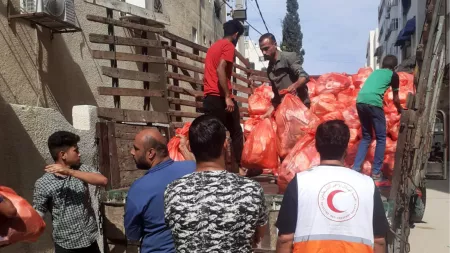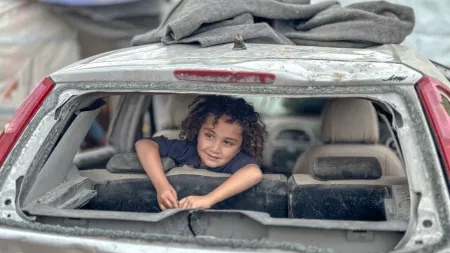Salwa Tibi, CARE’s Gaza Program Representative, shared the sense of respite the truce in the Israel-Gaza war has brought to her children and grandchildren. Despite the temporary relief, she also told us how nearly two months of conflict have completely changed her and her family's lives. There is no electricity at all in Rafah, city in Southern Gaza where she has fled. To simply communicate with us and relatives, she walked a long way to find someone with a generator and charge her mobile phone.
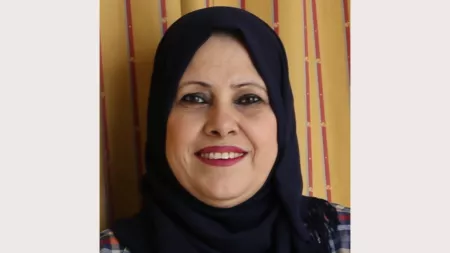
“The best thing in the last few days was to finally see the children smile again. My daughters and her children, they feel so much better. The children were very afraid of the bombing and shelling. Now, during the ceasefire, they do not have to fear the planes in the sky. They feel happy. I walked with them on the street. I wanted them to see the sun, the light, the good parts of life, and it was so heart-warming to see them at ease and happy. We walked through the neighbourhood, and they played with some of the local children, who are not displaced like us,” said Salwa Tibi, Gaza Program Representative.
Since the beginning of the conflict in early October, the Gaza Strip has become the most dangerous place in the world to be a child. According to UNICEF, over 5,300 children have died – 40 percent of the total death toll. In other words: over 110 children in Gaza have died every day since October 7, with hundreds more believed to remain under the rubble.
The first day of the ceasefire, I was too afraid to go out. I was not sure whether to trust the calm,said Salwa.
“We spent almost 50 days expecting to be killed any minute, it is hard to shrug this off. When I finally went out to the shops, the situation was hard. Most people spent around four hours at the market to search for food, just the basics. There is only one market for over a million people, and the prices have skyrocketed”, she added. According to the Palestinian Central Bureau of Statistics, prices for food and beverages have increased by 10 % just in October, vegetables by 32%, wheat flour by 65%, and water by 100%.
“I met some of my friends on the market, whom I know from home. Unlike us, they are not able to rent a house, and they stay in camps and schools. They were crying because they did not have enough money to buy what they needed. I gave them some money, because all they had were the clothes they were wearing when they had to leave their homes. I think this is what helps us all survive, the kindness and solidarity we show each other in these times of endless suffering. Everyone gives what they can and tries to support each other. But most of us are displaced from our homes now, and most of us have lost everything,” Salwa said.
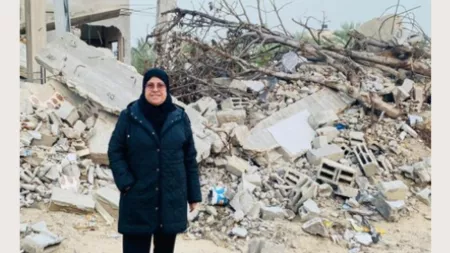
An entire population displaced
Like Salwa and her family, an approximate 1,7 million people – nearly 80% of the population -, have fled to the South. According to the UN, nearly 896,000 internally displaced people are sheltering in 99 facilities such as schools. In many of these shelters, overcrowding and poor sanitary conditions are rife, further worsened by the acute lack of water. Children especially have fallen sick with communicable diseases, and suffer from diarrhoea, acute respiratory infections, and hygiene-related conditions like lice.
While aid was finally able to reach some people for the first time in weeks, many still lack food and fuel to cook. Bakeries are not operational because of the lack of fuel, and wheat flour is no longer available. Aid organizations are particularly concerned about the lack of nutrition for pregnant and lactating women and children.
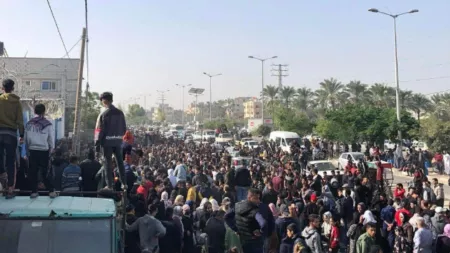
Like so many others, Salwa too, received the dreaded phone call over the weekend, informing her that her house in Gaza City is basically inhabitable now. “I worked for more than 25 years to build this house. I can’t believe all this is gone now. We have lost so much, and none of us expected this to last for such a long time. Our houses, we can rebuild. But we cannot bring back the people we love."
I lost 15 of my relatives, mostly children and women. Other family members are still in hospital, severely injured,Salwa told us.
Long lasting trauma
Since October 7, more than 14,000 people have reportedly been killed – almost 70% of which are women and children.
"I think we all need psychological support. The priority certainly are children, but everyone is affected. Our homes were destroyed, people were killed and wounded. Our hearts will be suffering for a long time, and I think we will all need help to get through this,” shared Salwa.
Even before the current conflict, numerous studies have documented high rates of mental health disorders like post-traumatic stress disorder (PTSD) and depression, especially among children and adolescents. Before the current escalation of violence, a staggering 80% of Palestinian children in Gaza reportedly suffered psychological distress. At the same time, only a handful of psychologists are working in Gaza, and psychosocial activities in schools are completely halted now.
I am so glad that the situation is calm right now. But everyone here on the streets talks about what comes next,said Salwa.
“As a humanitarian, as a mother and grandmother, I want a permanent pause in the fighting. Everyone wants peace. Everyone wants to go back to their homes, their lives. No one wants to live the life of a displaced person, fearing for the lives of their children, and constantly seeing them afraid and distressed,” she concluded.
CARE's asks and humanitarian response
CARE is urgently calling to turn the humanitarian pause into a permanent ceasefire and for unrestricted humanitarian access to reach survivors. More than 14,000 people have reportedly been killed so far, with thousands more still missing. CARE is particularly concerned about reaching women and children who are already dying of preventable deaths, caused by lack of clean water and medical supplies.
During the four-day truce, the CARE team in Gaza was able to secure 2,000 hygiene kits and 50,000 litres of water to be distributed to vulnerable displaced people. Each kit covers the hygiene needs of a family of five during one month. Last week, CARE was able to provide badly needed medical supplies to two mobile clinics, sufficient for serving around 4,000 people for one month; 500 hygiene kits, serving 2,500 people for one month; and shelter items such as blankets, thermal blankets and mattresses for 700 families (3,500 people).
